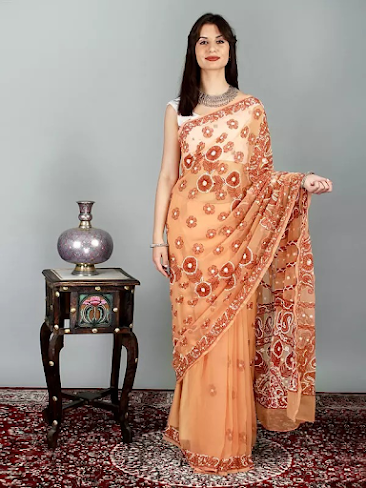The Timeless Charm of Chikankari Sarees: A Must-Have for Every Fashionista
Chikankari sarees have a unique place in the fashion world, capturing hearts with their timeless appeal and beautiful embroidery. These magnificent garments are a testament to India's rich heritage of culture and have quickly become a must-have for any fashionista. This essay will look at the beauty and charm of Chikankari sarees, as well as their historical significance, modern appeal, styling recommendations, and much more.
Chikankari sarees are traditional Indian fabrics embellished
with beautiful and elaborate Chikankari embroidery. Chikankari is a delicate
kind of white floral embroidery that includes elaborate handwork on fine fabric
that originated in the city of Lucknow in the 18th century. The sarees are made
with a variety of techniques, resulting in amazing and timeless pieces of art.
The historical significance of Chikankari sarees
Chikankari sarees have a long history. They were patronized
by Mughal rulers and were first created exclusively for royal families.
Chikankari sarees gained appeal among popularity over time, becoming a
symbol of elegance and grace. Under the patronage of the Nawabs, the art form
blossomed and is still a cherished craft today.
Traditional motifs and designs in Chikankari sarees
Chikankari sarees are decorated with a variety of
traditional motifs and designs. Embroidery is often made out of small stitches
that produce intricate patterns inspired by nature, such as flowers, leaves,
birds, and creepers. Paisleys, jasmine blooms (known as "genda
phool"), and "butis" or little decorative pieces are popular
motifs. These designs are meticulously hand-embroidered, adding an ethereal
beauty to the sarees.
Fabrics used in Chikankari sarees
Chikankari sarees are made from a variety of fabrics, each
with its own particular personality. These sarees are frequently made from
muslin, georgette, chiffon, and silk. These textiles' fine and lightweight
nature allows for elaborate embroidery and lends a lovely drape to the saree,
making it easy to wear.
Techniques used in chikankari embroidery
Chikankari embroidery involves several methods that necessitate outstanding skill and precision. "Shadow work" (where the embroidery is done on the reverse side of the fabric, creating a shadow-like effect), "phanda" (a small, dot-like stitch), "jaali" (intricate patterns created by removing threads), and "murri" (raised stitchwork) are some of the prominent techniques used in Chikankari sarees. These techniques work together to create hypnotic motifs that define the lure of Chikankari sarees.
Chikankari sarees in contemporary fashion
While Chikankari sarees have rich traditional roots, they
have smoothly translated into contemporary fashion. Designers have infused
modern features into Chikankari sarees by experimenting with fresh colors,
fabric combinations, and new patterns. This mix of traditional and modern
aesthetics has resulted in a new generation of Chikankari sarees that are
appealing to the younger generation while keeping their timeless charm.
Styling tips for Chikankari sarees
Consider matching Chikankari sarees with contrasting blouses
or experimenting with modern blouse styles to make a stylistic statement. To
complete the style, add traditional jewelry such as jhumkas (Indian
earrings), bangles, and bold necklaces. Allow the saree to take the stage by
wearing minimal makeup and a nicely arranged haircut. Chikankari sarees can be
worn for a variety of situations, including festivals and formal events.
Caring for Chikankari sarees
To preserve the beauty of Chikankari sarees, they must be
handled with care. Instead of washing them frequently, use light dry cleaning
when necessary. To avoid discoloration or damage, keep them in a clean, dry
place away from direct sunlight. You may keep your Chikankari sarees in
exquisite shape for years by following these simple care tips.
Chikankari sarees: A symbol of cultural heritage
Chikankari sarees are more than just clothing; they
represent India's diverse cultural history. Chikankari is a popular item
because of its delicate embroidery, craftsmanship, and historical significance.
We celebrate and maintain this ancient art form by wearing Chikankari sarees and passing them on to future generations.
Conclusion
The allure of Chikankari sarees cannot be denied. From their
historical significance to their contemporary fashion appeal, these outfits
continue to enchant fashion enthusiasts all around the world. Chikankari sarees
are a must-have for every fashionista because of their delicate hand embroidery,
traditional designs, and fabric selection. So, enjoy the timeless appeal of
Chikankari sarees and the elegance that they add to your wardrobe.







Comments
Post a Comment